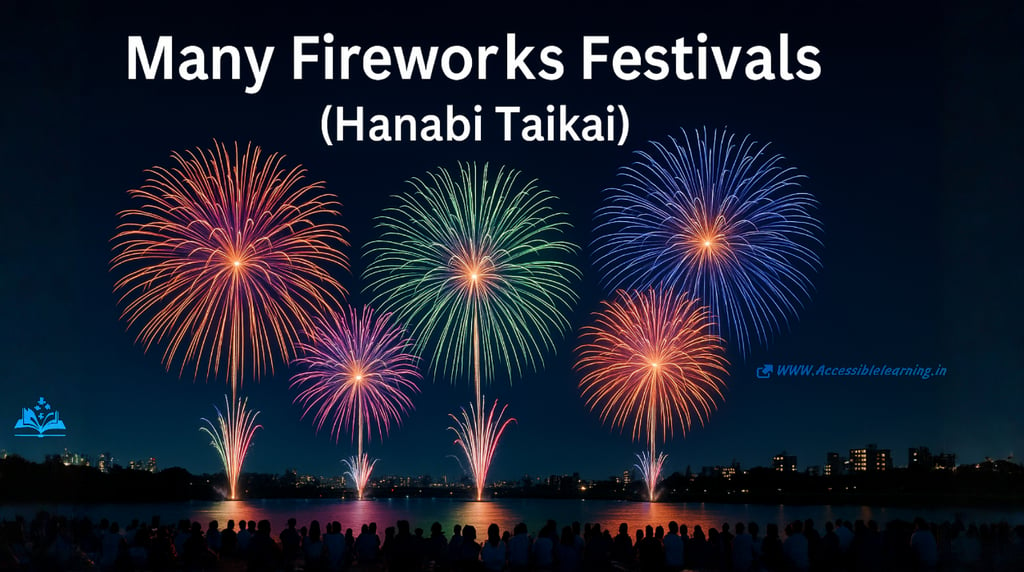
The Spirit of Hanabi Taikai: More Than Just Fireworks
Experience Japan’s summer magic with Hanabi Taikai—dazzling fireworks festivals that light up the night sky. Discover their cultural roots, must-visit locations, travel tips, and what makes these colorful celebrations unforgettable.
CULTURE/TRADITIONEVENT/SPECIALJAPANCELEBRATION/FESTIVALSTRAVEL LIFE
Kim Shin
8/1/20254 min read


Every summer, Japan’s night skies explode into a spectacle of color, light, and sound with its legendary Hanabi Taikai—fireworks festivals that attract millions of locals and tourists alike. These festivals are more than mere displays; they are an essential part of Japanese culture, symbolizing celebration, community, and the fleeting beauty of life. In this article, we’ll delve into the history, cultural significance, major festivals, travel tips, and what makes these firework events a truly unmissable experience.
What is Hanabi Taikai?
Hanabi (花火) literally means "fire flower" in Japanese, and Taikai (大会) translates to "big gathering" or "tournament." Together, Hanabi Taikai refers to grand-scale fireworks festivals held throughout Japan—primarily in July and August—to celebrate summer, Obon season, and local traditions.
These aren’t your average firework shows. Japan's fireworks are world-renowned for their innovative designs, choreographed bursts, and precision timing, often synchronized with music and storytelling.
A Brief History of Hanabi in Japan
The tradition dates back to the Edo Period (1603–1868). The first large-scale fireworks show, Ryōgoku Kawabiraki, was held in 1733 as a tribute to those who died in a great famine and to ward off evil spirits. Since then, Hanabi has evolved into an annual celebration of summer life and remembrance, with modern technology elevating the artistry to astonishing levels.
Popular Fireworks Festivals in Japan
Here are some of the most famous and must-see Hanabi Taikai that define the summer experience in Japan:
1. Sumida River Fireworks Festival (Tokyo)
When: Last Saturday of July
Where: Sumida River, near Asakusa
Why Visit: It’s Tokyo’s oldest and most iconic fireworks festival, dating back to 1733. Around 20,000 fireworks light up the Tokyo skyline with the backdrop of the Tokyo Skytree.
2. Nagaoka Fireworks Festival (Niigata Prefecture)
When: August 2–3
Where: Shinano River banks
Why Visit: Known for some of Japan’s largest fireworks, including the famous “Phoenix,” a kilometer-wide burst symbolizing post-war recovery and peace.
3. Lake Biwa Fireworks Festival (Shiga Prefecture)
When: Early August
Where: Otsu Port on Lake Biwa
Why Visit: Over 10,000 fireworks are launched over Japan’s largest lake, with reflections that create a double visual delight.
4. Miyajima Water Fireworks Festival (Hiroshima Prefecture)
When: Mid-August (occasionally canceled or rescheduled)
Where: Miyajima Island, near the famous “floating” torii gate of Itsukushima Shrine
Why Visit: Unique marine fireworks that explode directly from boats on the sea, framed by sacred sites.
5. Omagari Fireworks Competition (Akita Prefecture)
When: Late August
Where: Daisen City
Why Visit: A prestigious fireworks contest featuring pyrotechnicians from across Japan who compete in design, synchronization, and creativity.
6. Tenjin Matsuri Fireworks (Osaka)
When: July 25
Where: Okawa River
Why Visit: Blends a grand traditional festival (Tenjin Matsuri) with stunning fireworks and a riverboat procession, offering a cultural-meets-modern spectacle.

Cultural Meaning Behind Hanabi
In Japan, fireworks carry deep symbolism:
Transience of life (Mono no aware): The brief, brilliant explosion of fireworks mirrors the fleeting nature of life and beauty.
Obon Season: Many festivals coincide with Obon, a time when spirits of ancestors are believed to return. Fireworks serve as a spiritual guide and tribute.
Community Unity: These events are a time for bonding, shared experience, and celebrating local identity.
Hanabi Etiquette & Tips for Visitors
To fully enjoy a Hanabi Taikai, keep the following in mind:
Arrive Early: Prime viewing spots are claimed hours before the show, sometimes with picnic blankets and tarps.
Dress the Part: Many people wear yukata (summer kimono), enhancing the festive vibe and cultural immersion.
Bring Snacks & Drinks: Convenience stores near venues often sell out early, so plan ahead.
Public Transport Awareness: Trains and buses will be extremely crowded post-event; patience is key.
Respect Cleanliness: Japan’s cleanliness is maintained by attendees who bring trash bags and leave no litter behind.
Check Weather & Cancellations: Many festivals are postponed or canceled in case of rain.
Why Japan’s Fireworks Are So Special
Japanese fireworks artisans (hanabi-shi) undergo years of training to perfect their craft. Their designs go beyond simple colors—they create shapes like hearts, smiley faces, chrysanthemums, or kanji characters with precision. Japan’s use of chemical layering, symmetry, and musical syncing is unparalleled globally.
A Sensory & Spiritual Journey
For many, attending a Hanabi Taikai is not just about entertainment. It's an emotional journey—a nostalgic return to childhood, a tribute to lost loved ones, or a moment of awe that connects strangers under the same sky.
Whether you're wandering through lantern-lit paths, hearing the distant boom echoing over water, or simply lying back with friends on a warm night, the Hanabi Taikai offers a soulful slice of Japanese life.
If you're visiting Japan in the summer, experiencing a fireworks festival is an absolute must. It’s a unique blend of art, tradition, emotion, and community that leaves a lasting impression. Pack your yukata, grab your camera, and let the skies tell a thousand stories through color and light.
FAQs
Q: Are Hanabi Taikai free to attend?
Most are free, but some offer paid seating areas with better views and comfort.
Q: Can I view the festival from hotels or rooftops?
Yes, many local hotels offer special viewing plans, especially near major festival venues.
Q: Do smaller towns also have Hanabi Taikai?
Absolutely. Nearly every city and town hosts its own version, often showcasing regional pride and local artistry.
Q: Are fireworks safe to attend in Japan?
Yes, events are well-managed with clear safety protocols and police presence.
Q: What’s the best way to check festival dates?
Local tourism websites, event calendars, or apps like Japan Travel, Jalan, or JNTO are reliable sources.
Subscribe To Our Newsletter
All © Copyright reserved by Accessible-Learning Hub
| Terms & Conditions
Knowledge is power. Learn with Us. 📚


